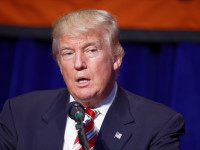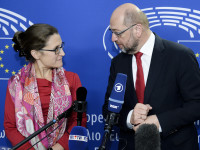The Trans Pacific Partnership, once left for dead after U.S. President Donald Trump withdrew from the agreement, is back with negotiations on a TPP11 (the original agreement featured 12 countries) set to resume next week. With reports indicating that dozens of provisions may be suspended, the Canadian government just concluded a public consultation on the issue. My full submission is posted below. It expresses concern with the lack of TPP transparency and provides comments on five substantive areas: dispute settlement, copyright, patents, e-commerce/digital trade, and culture.
Post Tagged with: "isds"
Panel Rejects Eli Lilly Claim Over Canadian Patent Law, Orders Company to Pay Millions in Costs
In the early 1990s, Eli Lilly applied for patent protection in Canada for two chemical compounds, olanzapine and atomoxetine. The company had already obtained patents over the compounds, but asserted that it had evidence to support new uses for the compounds that merited further protection. The Canadian patent office granted the patents based on the content in the applications, but they remained subject to challenge.
Both patents ultimately were challenged on the grounds that there was insufficient evidence at the time of the applications to support the company’s claims. The Federal Court of Canada agreed, invalidating both patents. Eli Lilly proceeded to appeal the decision to the Federal Court of Appeal and later to the Supreme Court of Canada. The company lost the appeals, as the courts upheld the decision to invalidate the patents.
Under most circumstances, that would conclude the legal story as several Canadian courts reviewed Eli Lilly’s patent applications and ruled that they failed to meet the standards for patentability. Yet in June 2013, the company served notice that it planned to use the ISDS provisions in the North American Free Trade Agreement to claim that in light of the decisions, Canada was not compliant with its patent law obligations under the treaty. As compensation, Eli Lilly sought at least $500 million in damages.
Back to the Drawing Board as Trump Kills the TPP
President-Elect Donald Trump has ended any further speculation about the future of the Trans Pacific Partnership by announcing that he plans to formally withdraw from the agreement on his first day in office. I’ve written extensively about why ratification for Canada would be a mistake and argued last week in the Globe that Canada should use the death of the TPP as an opportunity to re-examine its approach to trade agreement negotiations including working toward greater transparency, focusing on tariff reduction rather than regulations, and dropping controversial ISDS provisions.
The need for Canada to wait on the U.S. has been readily apparent for months. As currently structured, the TPP cannot take effect without the U.S. since entering into force requires ratification by at least six signatories who represent at least 85 percent of the GDP of the countries in the original deal. That provision effectively gives both the U.S. and Japan veto power. With the U.S. pulling out, the agreement will not enter into force no matter what Canada (or anyone else) does.
The central role of the U.S. in the TPP is no accident. For most TPP countries, access to the U.S. market was the primary reason for entering into the agreement and as Japanese Prime Minister Shinzo Abe said over the weekend, “the TPP would be meaningless without the United States.” Indeed, the reason Canada, Japan, and Mexico all joined the TPP talks late was that without a clear commitment from the U.S., the agreement was of limited value.
The Devil is in the Details: Why CETA is on the Verge of Collapse
The seeming collapse of the trade agreement between Canada and the European Union (CETA) has created obvious disappointment for International Trade Minister Chrystia Freeland and the entire Canadian government, which made the deal as its top trade issue. Efforts to salvage CETA will undoubtedly continue, but my Globe and Mail column points out that the underlying problem with the agreement is not the complicated European political system that requires support from all member states.
Rather, it is the expansion of trade negotiations from agreements that once focused primarily on tariff reductions to far broader regulatory documents that now mandate domestic legal reforms and establish dispute resolution systems that can be result in huge liability for national governments. This enlarged approach to trade deals, which can also be found in the controversial Trans Pacific Partnership (TPP), run the risk of surrendering domestic policy choices to other countries or dispute tribunals.
If CETA were limited to tariff reductions, it would be relatively uncontroversial. The discomfort with the agreement lies instead in the mandated changes to domestic regulations and the creation of investor – state dispute settlement mechanisms that may prioritize corporate concerns over local rules.
CETA Talks Break Down: “It is Evident that the EU Is Incapable of Reaching an Agreement”
International Trade Minister Chrystia Freeland has walked out of talks aimed at addressing Belgian opposition to the Canada-EU Trade Agreement, stating:
I have personally worked very hard, but it is now evident to me, evident to Canada, that the European Union is incapable of reaching an agreement – even with a country with European values such as Canada, even with a country as nice and as patient as Canada. Canada is disappointed and I personally am disappointed, but I think it’s impossible. We are returning home.
Leaving aside the odd reference to how nice Canada is, this is remarkable language that lays bare the obvious frustration and disappointment for the government which prioritized the CETA agreement above all others. The prospect of the deal falling apart has been evident for months. I wrote in July that the agreement was in more trouble than the Canadian government would admit, noting that opposition from any national or regional government could kill CETA altogether. Canadian officials downplayed the risk, but it was obvious that CETA faced stiff opposition that would not be easy to overcome.











